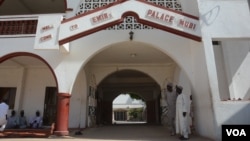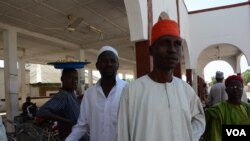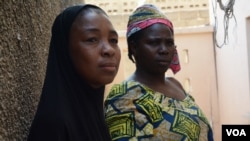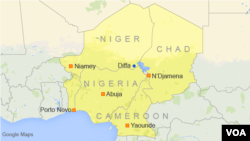In October, Boko Haram militants seized Mubi, the commercial hub in Nigeria’s northern Adamawa state -- making it the biggest town under the insurgents' control before the Nigerian military re-captured it November. In those few weeks, the militants ruled by whim, conscripted by gunpoint, and imposed harsh punishments.
The head bodyguard for the Emir of Mubi, Abdullahi Umaru, could do nothing but watch as Boko Haram fighters stomped across his boss’ polished floors and manhandled expensive furniture before they settled in the ruler’s private quarters.
They then proceeded to the emir’s private fleet of cars to take their pick.
“They only chose the best cars,” Umaru said.
That was in late October, when Boko Haram seized Mubi, raised their black flag and promptly renamed the town Madinatul Islam -- City of Islam. Taking control of the second largest town in Adamawa state was part of the terrorist group’s quest to establish a caliphate in northern Nigeria.
Soon after, the group banned drinking and smoking and carried out lashings and amputations on people accused of stealing, said Isa Barade, the Emir’s head servant.
“The militants themselves, however, were not very good Muslims,” he said, noting the Boko Haram fighters looted shops and occupied private homes.
Barade said the militants did make a limited effort to win the hearts of the townspeople, occasionally handing out some stolen food and goods.
“They used to tell us to not be afraid. That they were fighting the military, not the population,” he said.
Boko Haram effectively cut the town off from the world. In the market, basic goods like pasta, rice and flour became scarce.
They cut mobile phone service and used satellite phones to run operations.
Some of the residents noticed the fighters observed a clear command structure but lacked discipline.
“It was clear they were local recruits who just joined because the militants paid them,” Umaru said.
The fighters also took children to a nearby field for military and weapons training. For the women of Mubi, life under Boko Haram was especially difficult.
“As a woman you could still move in the streets but you had to make sure to not look at the fighters,” said Sarawu Adamu.
The penalty for looking at a Boko Haram militant was 70 lashes.
“To constantly worry for your husband and children made many women go crazy,” she said.
And then there were the forced marriages.
If the insurgents saw a girl they liked, they would approach the parents offering them between $50 to $100. Girls 15 years and older were considered eligible.
She said the parents had been told by the emir not to resist or fight back, so they would agree to the fighters’ offers and then try to send their daughters away before the marriage could take place.
When the insurgents understood the Nigerian army was coming, they left Mubi in a hurry.
While Mubi has since been liberated, Boko Haram still controls a large territory in the northeast.
The threat they pose has forced a six-week delay in national elections to let a new regional force carry out a military operation to give towns and villages here enough security to vote.
But after years of fighting, thousands killed and about 1 million displaced, many Nigerians are asking: “What difference will a few more weeks make?”












